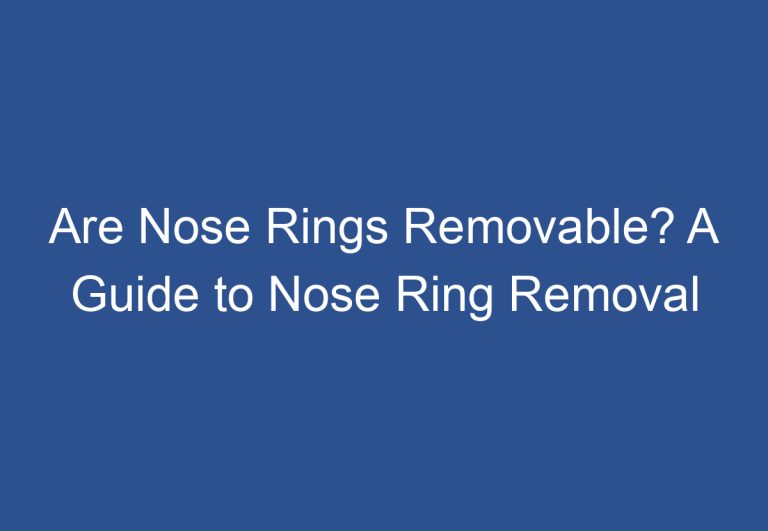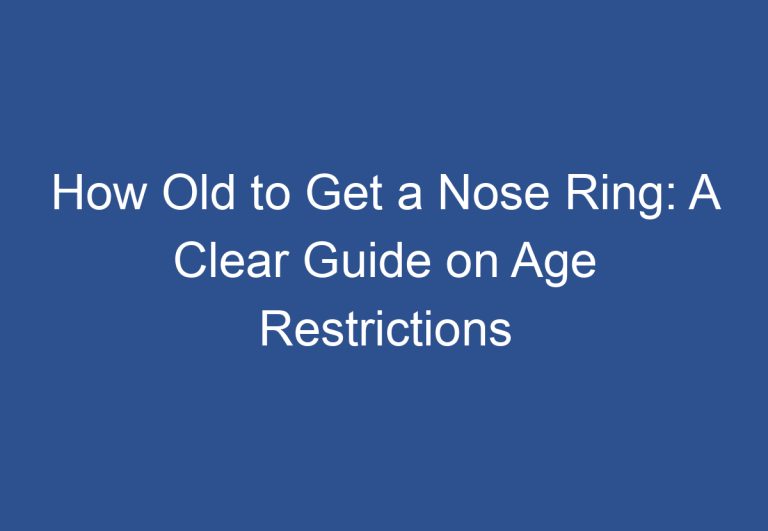How Often Do Nose Rings Get Infected: A Comprehensive Guide
Nose piercings have become a popular fashion trend in recent years. While they can be a great way to express oneself, it’s important to take proper care of the piercing to avoid infection. Infections can occur in any piercing, but they are particularly common in nose piercings due to the location and the increased likelihood of coming into contact with bacteria.

So, how often do nose rings get infected? The answer to this question is not straightforward. Some people may never experience an infection, while others may experience multiple infections. The risk of infection can depend on several factors, including the individual’s immune system, the type of jewelry used, and the level of care taken to keep the piercing clean. It’s important to note that infections can occur even after the piercing has fully healed.
Understanding Nose Piercing Infections

Getting a nose piercing is a popular form of self-expression, but it’s important to understand the risks involved. One of the most common complications associated with nose piercings is infection. In this section, we will discuss the causes of nose piercing infections, how to recognize the signs of infection, and potential complications that can arise if left untreated.
Causes of Infection
Nose piercing infections are typically caused by bacteria that enter the piercing site. This can happen if the piercing is not properly cleaned or if the person touches the piercing with dirty hands. Swimming pools and other bodies of water can also harbor bacteria that can cause infections. In some cases, an allergic reaction to the jewelry can also cause an infection.
Recognizing the Signs of Infection
It’s important to recognize the signs of an infected nose piercing so that it can be treated promptly. Common symptoms include redness, swelling, pain, tenderness, and discharge. In some cases, the discharge may contain pus and have a foul odor. If the infection spreads, a fever may develop. In more severe cases, a keloid or scar tissue may form, or an abscess may develop.
Complications from Infected Nose Piercings
If left untreated, an infected nose piercing can lead to a variety of complications. Inflammation can spread to other parts of the body, and the infection can become systemic. This can be particularly dangerous for people with weakened immune systems. In rare cases, the infection can lead to sepsis, a life-threatening condition. Prompt treatment is essential to prevent complications and ensure a full recovery.
To minimize the risk of infection, it’s important to follow proper aftercare instructions and keep the piercing site clean. If you suspect that your nose piercing is infected, seek medical attention right away. With proper treatment, most infections can be treated successfully, and the piercing can heal without complications.
Prevention and Treatment

Effective Aftercare Practices
Taking good care of a nose piercing is crucial to prevent infections. The healing process can take up to several months, and during this time, it is important to maintain good hygiene and follow effective aftercare practices. Cleaning the piercing regularly with a saline solution or sea salt solution can help prevent infections. It is recommended to use an antibacterial soap to clean the piercing, but it should be gentle and fragrance-free.
Home Remedies and When to See a Doctor
If a nose piercing becomes infected, there are several home remedies that can help manage the symptoms. A warm compress can help reduce pain and swelling, and tea tree oil and chamomile tea have anti-inflammatory properties that can help soothe the skin. Aloe vera gel can also be applied to the infected area to help relieve pain and promote healing. However, if the infection persists or gets worse, it is important to see a dermatologist or doctor. They may prescribe an oral antibiotic or recommend topical antibiotics to treat the infection.
Managing Pain and Swelling
Pain and swelling are common symptoms of a nose piercing infection. Over-the-counter pain relievers such as ibuprofen can help manage pain and reduce inflammation. It is important to avoid touching the piercing with dirty hands or exposing it to irritants such as makeup or hair products. If the swelling and pain persist, it is important to seek medical attention to prevent the infection from spreading.
In summary, preventing infections in nose piercings is crucial to ensure a smooth healing process. Effective aftercare practices such as cleaning the piercing regularly with a saline solution and using gentle antibacterial soap can help prevent infections. Home remedies such as warm compresses and aloe vera gel can help manage pain and swelling, but it is important to seek medical attention if the infection persists or gets worse.
Frequently Asked Questions

What are the signs of an infected nose piercing?
An infected nose piercing can be identified by redness and swelling around the piercing site, pain or tenderness around the piercing site, discharge or pus coming from the piercing site, and fever or chills. If you experience any of these symptoms, it is important to seek medical attention immediately.
How can you differentiate between normal healing and an infection in a nose piercing?
Normal healing of a nose piercing involves some redness, swelling, and tenderness around the piercing site. However, if the redness and swelling do not subside after a few days or if you notice pus or discharge coming from the piercing site, it may be a sign of an infection.
What should be done to treat an infected nose piercing at home?
If you suspect that your nose piercing is infected, it is important to clean the piercing site with saline solution and avoid touching the piercing with dirty hands. Applying a warm compress to the area can help reduce pain and swelling. Over-the-counter pain relievers can also be taken to reduce pain and fever. If the infection does not improve after a few days, it is important to seek medical attention.
How can an infected nose piercing be prevented?
To prevent an infected nose piercing, it is important to clean the piercing site regularly with saline solution and avoid touching the piercing with dirty hands. It is also important to avoid swimming or soaking the piercing in water for the first few weeks after getting the piercing. Additionally, it is important to avoid using harsh cleaning products or makeup around the piercing site.
What are the risks of an untreated nose piercing infection?
If left untreated, a nose piercing infection can lead to more serious health complications, including the spread of infection to other parts of the body. In severe cases, an untreated infection can lead to abscesses, scarring, and permanent damage to the nose.
How long does it typically take for a nose piercing to heal completely?
The healing time for a nose piercing can vary depending on the individual and the type of piercing. In general, a nose piercing can take anywhere from 4 to 12 months to heal completely. It is important to follow proper aftercare instructions and avoid touching the piercing during the healing process to ensure proper healing.






